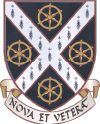Teaching
I teach widely in clinical medicine, particularly general medicine and cardiology. Students from all three years of the clinical course at St. Catherine’s are taught, though focussing on year 6 in the first half of the year (pre-finals) and year 4 in the second half (year 5 are mostly out on specialist attachments). I also teach on the cardiology special study module in year 6. I lecture on cardiovascular physiology and imaging for both the University of Oxford and Brookes University, and oversee the training in cardiac imaging for cardiology registrars in Oxford, and training in the very specialised imaging of cardiac magnetic resonance. Outside Oxford, I lecture nationally and internationally on cardiology and cardiac imaging mostly.
About me
I’m a consultant cardiologist at the John Radcliffe Hospital in Oxford and an Honorary Senior Clinical Lecturer at the University of Oxford Department of Cardiovascular Medicine. I specialise in non-invasive cardiac imaging, particularly cardiovascular magnetic resonance, and my clinical and research interests are in valve disease and cardiomyopathies. I qualified from the University of Bristol and completed further training in London and Oxford. I have published widely, am editor of several Oxford Handbooks, including Cardiology Emergencies; Cardiovascular Magnetic Resonance; and Valve Disease, and was president of the British Junior Cardiologists Association from 2005-2007
Research
My research currently focusses on two main areas:
1) Quantitative measurement in cardiac valve disease, examining whether cardiovascular magnetic resonance (CMR), an advanced cardiac imaging technique, can improve the clinical management of patients with heart valve disease. The detailed quantitative information available from CMR may be able to predict the onset of symptoms in the 3 main types of cardiac valve disease (aortic stenosis, aortic regurgitation and mitral regurgitation). If successful, this research could have a major impact on the management of these patients, and help to elucidate the mechanisms of cardiac dysfunction in valve disease.
2) The physiological effects of ACE inhibitors in asymptomatic aortic stenosis. The potential for drug treatment of this common heart valve condition has being tested in an initial clinical trial, and I am setting up a second large multi-centre trial to examine the clinical benefit. Patients with aortic stenosis (a narrowing of the main valve out of the heart) can develop a thickened heart muscle and heart failure, both of which are detrimental. A group of drugs called ACE inhibitors may improve the ability of the heart muscle to cope with the valve disease, which might delay the onset of symptoms and the need for heart surgery. We hope to identify and improve the mechanisms underlying the progression to heart failure
Graduate supervision
I supervise DPhil students in the Department of Cardiovascular Medicine (currently 3), and my first student was awarded her DPhil last year.


